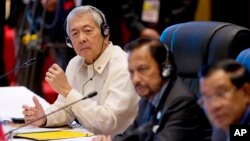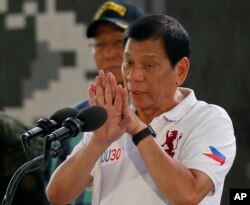The top Philippines diplomat has cautioned the United States against lecturing his government on human rights, prompting a White House spokesman to urge all countries, especially allies, to uphold universal human rights.
Speaking Thursday in Washington, Foreign Secretary Perfecto Yasay called for mutual respect between his country and its former colonial power, saying Filipinos are not “the little brown brothers of America.''
However, Yasay assured a group at the Center for Strategic and International Studies that Manila is committed to a positive relationship with the United States.
His appearance followed a string of controversial statements by new Philippine President Rodrigo Duterte.
Duterte urged U.S. President Barack Obama not to question him about extrajudicial killings, or, he warned, "Son of a whore, I will swear at you."
After the remarks, Obama called on his advisers to determine whether a scheduled meeting with Duterte at the Association of Southeast Asian Nations summit in Vientiane, Laos, last week would be productive. The White House canceled the meeting, although the leaders exchanged “pleasantries” during a brief meeting at the ASEAN dinner gala.
Obama later said Duterte’s remarks did not affect relations between the allied nations.
'Look at our aspirations'
"I am asking our American friends, American leaders, to look at our aspirations," Yasay said. "We cannot forever be the little brown brothers of America. ... We have to develop, we have to grow and become the big brother of our own people.”
The foreign secretary urged Washington not to give lectures on human rights as a condition for receiving American help.
“You do not go to the Philippines and say, 'I am going to give you something. I am going to help you grow, but this is the checklist you must comply with. We will lecture you on human rights,' " said Yasay.
At the White House, spokesman Josh Earnest said Obama "has made quite clear that human rights impacts our relationship with the Philippines.”
The U.S. has worked closely with Manila on combating terrorism, extremism and violence connected to the drug trade, Earnest said.
“It’s important, however, that as those kinds of operations and efforts are undertaken, that universal human rights are protected, and engaging in that kind of law enforcement activity consistent with our commitment to human rights is important,” he added. “And we certainly encourage countries around the world, particularly our allies, to do exactly that.”
Duterte has drawn the ire of the United States for his bloody crackdown on the drug trade, killing more than 3,000 suspected drug users and dealers since assuming the presidency in June.
Security ties
Yasay also sought to walk back suggestions by Duterte that Manila plans to curb its security alliance with Washington. He said the Philippines is committed to a defense pact that gives the U.S. access to five Philippine military bases.
However, Yasay confirmed that Manila does not want to take part in joint U.S.-Philippines patrol exercises in disputed waters in the South China Sea, as it previously has done.
At the Pentagon Thursday, a spokesman, Navy Commander Gary Ross, said, "We have conducted three [such] patrols. The first patrol was conducted in March, with the second completed in early April. Our last joint patrol was in July.
"Our relationship with the Philippines is broad and our alliance is one of our most enduring relationships in the Asia-Pacific region. It has been a cornerstone of stability for over 70 years. The Filipino people are some of our closest friends and allies, and our relationship is built on shared sacrifices for democracy and human rights and strong people-to-people and societal ties."





